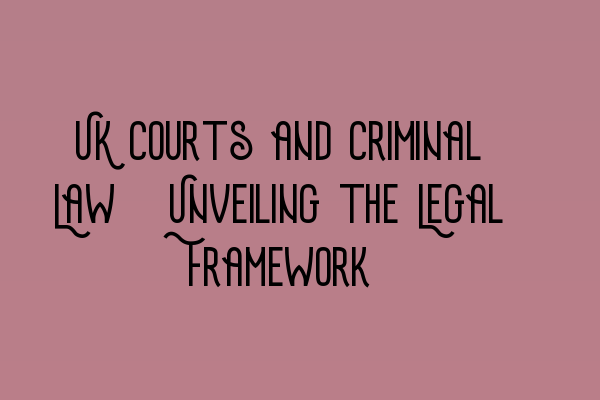UK Courts and Criminal Law: Unveiling the Legal Framework
When it comes to understanding the legal framework of criminal law in the UK, it is crucial to have a clear knowledge of the various courts that preside over criminal cases. These courts play a significant role in ensuring justice is served and the rule of law is upheld. In this article, we will delve into the structure and function of UK courts in the context of criminal law, shedding light on how they operate and interact within the legal system.
The Magistrates’ Courts
One of the key components of the UK’s criminal justice system is the Magistrates’ Courts. These courts serve as the entry point for most criminal cases. They are presided over by magistrates, who are laypeople chosen from the local community. Magistrates’ Courts deal with less serious criminal offenses, such as minor assaults, theft, and driving offenses.
It is worth noting that some more serious offenses, such as rape or murder, may start in the Magistrates’ Courts for an initial appearance, but they are then referred to the Crown Court for trial and sentencing. This initial appearance serves to determine whether there is sufficient evidence to warrant a trial.
If you are looking for in-depth guidance on the functioning of Magistrates’ Courts, our Workshops and Seminars on Criminal Practice: Expanding Your Expertise offer comprehensive insights into the Magistrates’ Court procedures and practices.
The Crown Court
The Crown Court takes over the jurisdiction of cases that are too serious for the Magistrates’ Courts. It primarily deals with indictable offenses and acts as a trial court for more complex criminal cases. The Crown Court is presided over by a judge and a jury, with the judge being responsible for legal matters and the jury determining guilt or innocence.
Crucially, the Crown Court also plays a role in sentencing individuals who have been found guilty in either the Magistrates’ Court or the Crown Court. They have the authority to impose custodial sentences, including imprisonment, as well as fines and community orders. The severity of the offense and the defendant’s criminal history are taken into account when determining the appropriate punishment.
To stay up-to-date with the latest developments in UK criminal law, we recommend reading our article on Updates in UK Criminal Laws: Staying Informed and Prepared. It will help you stay informed about any changes that may affect your criminal law practice.
The Supreme Court
The Supreme Court represents the highest court in the UK’s legal system and has the ultimate authority to interpret and apply the law. Although it does not deal specifically with criminal law cases, it does hear appeals from lower courts on matters of legal importance. This includes cases involving criminal law, where a point of law needs to be clarified or determined.
It is important to note that the Supreme Court does not generally hear appeals on facts but focuses on the interpretation and application of the law. It comprises a panel of judges, usually numbering between five and nine, who are often considered some of the most prominent legal minds in the UK.
Conclusion
In conclusion, understanding the legal framework of criminal law in the UK requires a solid grasp of the various courts that handle criminal cases. From the Magistrates’ Courts that deal with less serious offenses to the Crown Court that presides over more complex cases, each court plays a crucial role in ensuring justice is served.
If you are preparing for the SQE Criminal Practice Exam, our Mock Tests for SQE Criminal Practice: Exam Simulation for Success are designed to enhance your exam preparation, giving you the practice and confidence you need to succeed.
For a more comprehensive understanding of criminal evidence rules and their impact on criminal cases, our article on Decoding Criminal Evidence Rules: A Detailed Analysis delves into the intricacies of this area of criminal law practice.
Remember, at SQE Criminal Law & Practice Law UK, we are committed to providing you with the resources and knowledge you need to excel in the field of criminal law. Stay tuned for more informative articles and insights to enhance your SQE Criminal Law study group experience.
